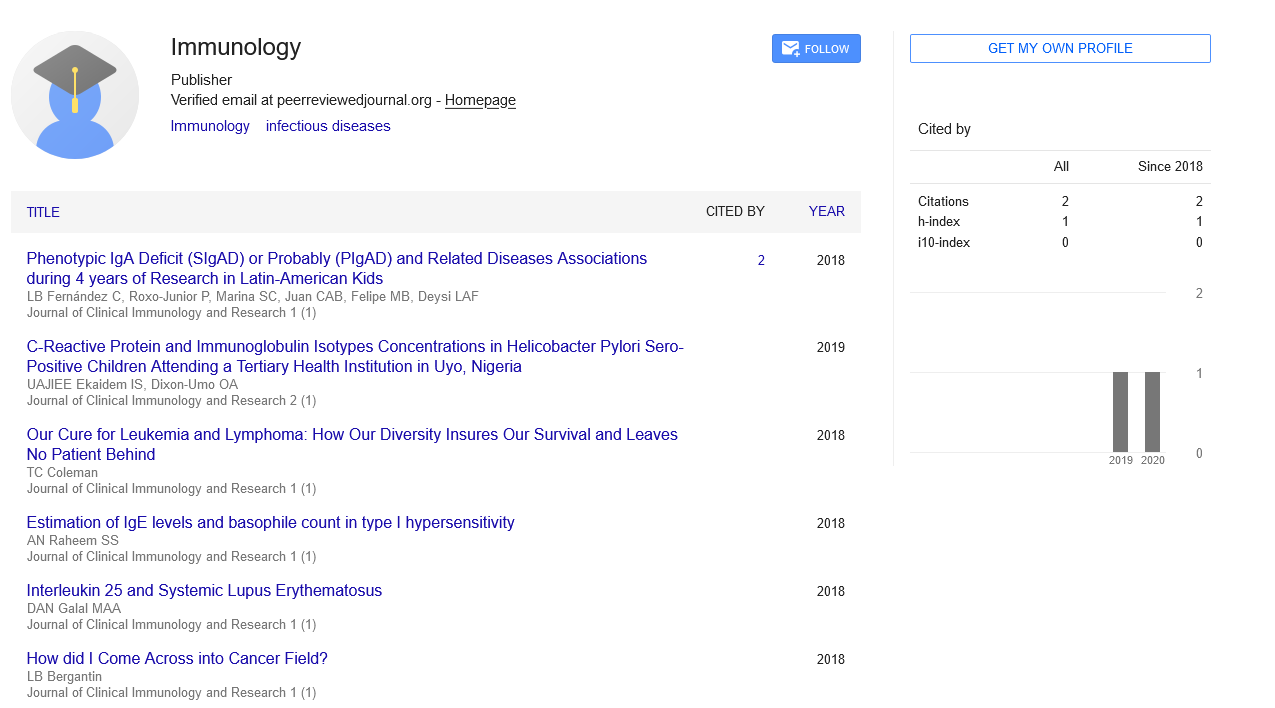Opinion Article, J Clin Immunol Res Vol: 6 Issue: 1
Pharmacological Interventions to Modulate the Immune System
Michel Lubinin*
1Department of Microbiology, Perelman School of Medicine, University of Pennsylvania, Philadelphia, United States of America
*Corresponding Author: Michel Lubinin
Department of Microbiology, Perelman
School of Medicine, University of Pennsylvania, Philadelphia, United States of
America
E-mail: michlubin@chop.edu
Received date: 19 March, 2023, Manuscript No. JCIR-23-99630;
Editor assigned date: 22 March, 2023, PreQC No. JCIR-23-99630 (PQ);
Reviewed date: 05 April, 2023, QC No. JCIR-23-99630;
Revised date: 12 April, 2023, Manuscript No. JCIR-23-99630 (R);
Published date: 19 April, 2023, DOI: 10.4172/JCIR.100074
Citation: Lubinin M (2023) Pharmacological Interventions to Modulate the Immune System. J Clin Immunol Res 6:1.
Description
The immune system plays a vital role in protecting the body against pathogens and maintaining overall health. However, in certain disease conditions, the immune system can become dysregulated, leading to either overactive immune responses or immune suppression. Pharmacological interventions aimed at modulating the immune system have emerged as important strategies for the treatment of various immune-related disorders.
Immunosuppressants are a class of drugs that dampen the immune response, primarily used in conditions where the immune system is overactive or misdirected. They are commonly employed in organ transplantation, autoimmune diseases, and allergic reactions. Examples of immunosuppressants include corticosteroids, calcineurin inhibitors (e.g., cyclosporine), and immunomodulatory agents (e.g., methotrexate). These drugs work by inhibiting immune cell activation, cytokine production, or specific immune pathways, thereby reducing inflammation and preventing tissue damage.
Immunostimulants are drugs that enhance the immune response and are used to boost the immune system in situations where it is weakened or compromised. They are particularly valuable in individuals with immunodeficiencies or those prone to recurrent infections. Immunostimulant drugs include interferons, interleukins, and colony-stimulating factors. These drugs activate immune cells, promote immune cell proliferation and differentiation, and enhance the body's defense mechanisms against pathogens.
Monoclonal Antibodies (mAbs) are engineered antibodies that target specific molecules or cells involved in immune responses. Theyhave revolutionized the field of immune modulation and are extensively used in the treatment of cancer, autoimmune diseases, and inflammatory conditions. mAbs can bind to specific receptors or molecules on immune cells, either blocking their activity or activating them to elicit desired immune responses. Examples of therapeutic mAbs include rituximab, infliximab, and pembrolizumab, which target specific immune cell populations or molecules implicated in various diseases.
Cytokines modulators are key signaling molecules that regulate immune responses. Pharmacological interventions targeting cytokines or their receptors have proven effective in several immune-mediated disorders. For example, Tumor Necrosis Factor-alpha (TNF-α) inhibitors, such as adalimumab and etanercept, are used in the treatment of autoimmune diseases like rheumatoid arthritis and inflammatory bowel disease. These drugs neutralize the action of TNF- α, reducing inflammation and ameliorating disease symptoms. Similarly, interleukin inhibitors, such as ustekinumab and secukinumab, target specific interleukins involved in diseases like psoriasis and rheumatoid arthritis.
Immunomodulatory agents encompass a diverse group of drugs that exert broad effects on the immune system. They can enhance or suppress immune responses depending on the specific context. For instance, glucocorticoids, commonly used anti-inflammatory drugs, have immunomodulatory properties by regulating gene expression and inhibiting immune cell activation. Other immunomodulatory agents, such as thalidomide and lenalidomide, have shown efficacy in modulating immune responses in conditions like multiple myeloma and certain autoimmune diseases.
Conclusion
Pharmacological interventions to modulate the immune system have significantly impacted the management of immune-related disorders. Immunosuppressants, immunostimulants, monoclonal antibodies, cytokine modulators, and immunomodulatory agents have emerged as powerful tools for fine-tuning immune responses in diverse disease settings. Continued analysis and development in immune pharmacology can do the discovery of novel therapeutic agents and improved treatment outcomes in immune-related diseases. Careful consideration of the potential side effects and individual patient characteristics is necessary to optimize the use of these interventions and achieve optimal immune modulation for better health outcomes.
 Spanish
Spanish  Chinese
Chinese  Russian
Russian  German
German  French
French  Japanese
Japanese  Portuguese
Portuguese  Hindi
Hindi 